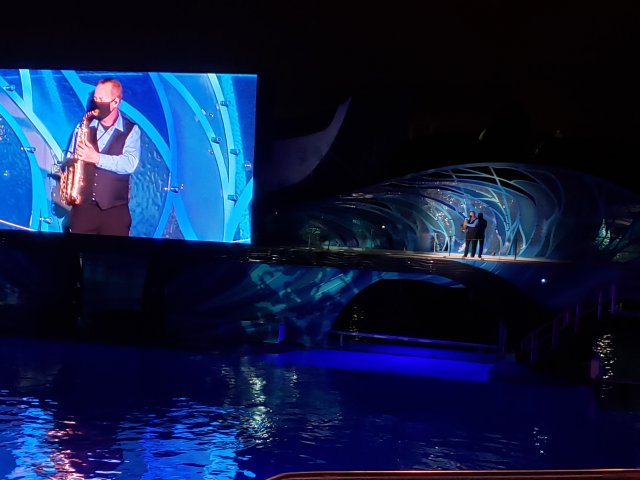I'm a bona fide mask agnostic. I've always considered wearing a mask a small thing to do to make other people feel more comfortable, and have worn one in most public situations since before they were required.
But I hate 'em (even though ours are creations of beauty), hate still more that they are mandatory in so many places, and can't wait until "this too shall pass." (Though I plan to keep my masks and continue to use them in occasional, appropriate situations, such as on an airplane, when I'm not feeling up to par and am out in public—and also when my nose is cold.)
Masks are not magic, and the more people treat them that way, the more skeptical I become. The following photos are from a visit to Orlando's Sea World. Note that the saxophone player—though alone on stage—is wearing a mask. Now check out, in the next picture, how far away he is from the audience.
This is a prime example of the religion of masks, of masks as magic. Some have insisted to me that the sax player must wear a mask to set a good example for the visitors to the park, though everyone I saw was already wearing masks, for the simple reason that they didn't want to get thrown out of the park they'd paid so much to get into. To me, such extreme maskism only says to me that no one here is thinking about what makes a mask effective. Nothing from that man's mouth or nose—let alone his instrument—was going to reach far across the water to infect someone, even if he were to scream at them at top volume.
People are, in general, willing to follow rules that make sense to them. Take away the sense, and even the most compliant folks start to question everything. It's like the "lawyer warnings" that come with every new appliance these days. With rules such as "don't use this hair dryer while taking a shower" receiving as much prominence as warnings that a sane person might actually need to hear, most people don't bother to read them at all.
As I said, I'm a mask agnostic. I guess my philosophy is reduce the viral load, whether it's COVID-19 or a common cold virus. I'm pretty sure masks do this. As far as I've been able to tell, there's no hard scientific evidence that proves the effectiveness of mandatory mask-wearing, but basic logic says that it's better not to get sneezed on. Wearing a mask in situations when it might reduce the transmission of this strange new virus is a logical extension I can get behind. (Making it mandatory is another issue, but one I'm not going to deal with here.)
Which brings me to the inspiration for this post, which came from a Mauldin Economics newsletter. It's only anecdotal evidence, not scientific, but it's an encouraging word that masks can make a difference. The story is from a recent conference, mostly video but with some in-person participants.
They had a small group of live participants ... [who did not wear masks but] were tested before anyone came and were tested every day during the conference. By the end, a significant portion of the attendees had acquired COVID-19.... Interestingly, they had 17 production staff, who all wore masks and intermingled with the unmasked participants. They were tested, too, and not one came down with the virus.
There are many questions that come to mind, not least of which is where the COVID-19 came from if all the participants tested negative before arrival. But the fact that none of the masked production staff caught the virus encourages me that mask-wearing does, indeed, reduce the viral transmission.
This seems like a good time to add the comment I've been itching to make, misquoting by just one letter a distant relative, Henry of Navarre (King Henry IV of France) when he chose to become a Catholic. I can't believe I'm the first to say it, but Google seems to think so.
Our planned trips to Europe keep getting cancelled on us, so I don't know when I'll have the chance to worry about face-covering rules in France. But whenever we return, there's no doubt in my mind:
Paris is worth a mask.
You do provoke the inner critic, and as a musician, I am easily offended, so my reaction is to defend something I don't care about: masks. What about back stage? Might he be in a small room with the other musicians just before he sets food on stage? He could take the mask on and off, but as every perfermer knows, that invites an awkward "mask falling moment" - of which I am sure you have witnessed plenty. Safe is safe, and the show must go on. I don't know if it makes sense, but it doesn't necessarily have to be magic.
The funny thing is, I agree with you that people treat masks as though they were magic. Yet here I am arguing with you for no reason . . .
That's a good point; it would have been a pain to take the mask on and off going to and from backstage, where there would be other performers.
It's not that I believe the sax player thinks masks are magic; it's that that attitude seems to be promoted both by those in authority and in popular culture. Except, of course, for those people who think masks accomplish nothing but subjugation. Can we get a middle ground here?
I suspect the "magic" that Sea World really hopes to invoke is whatever it takes to keep the government and the lawyers off their backs.




